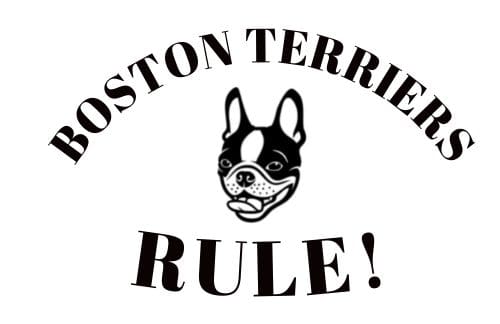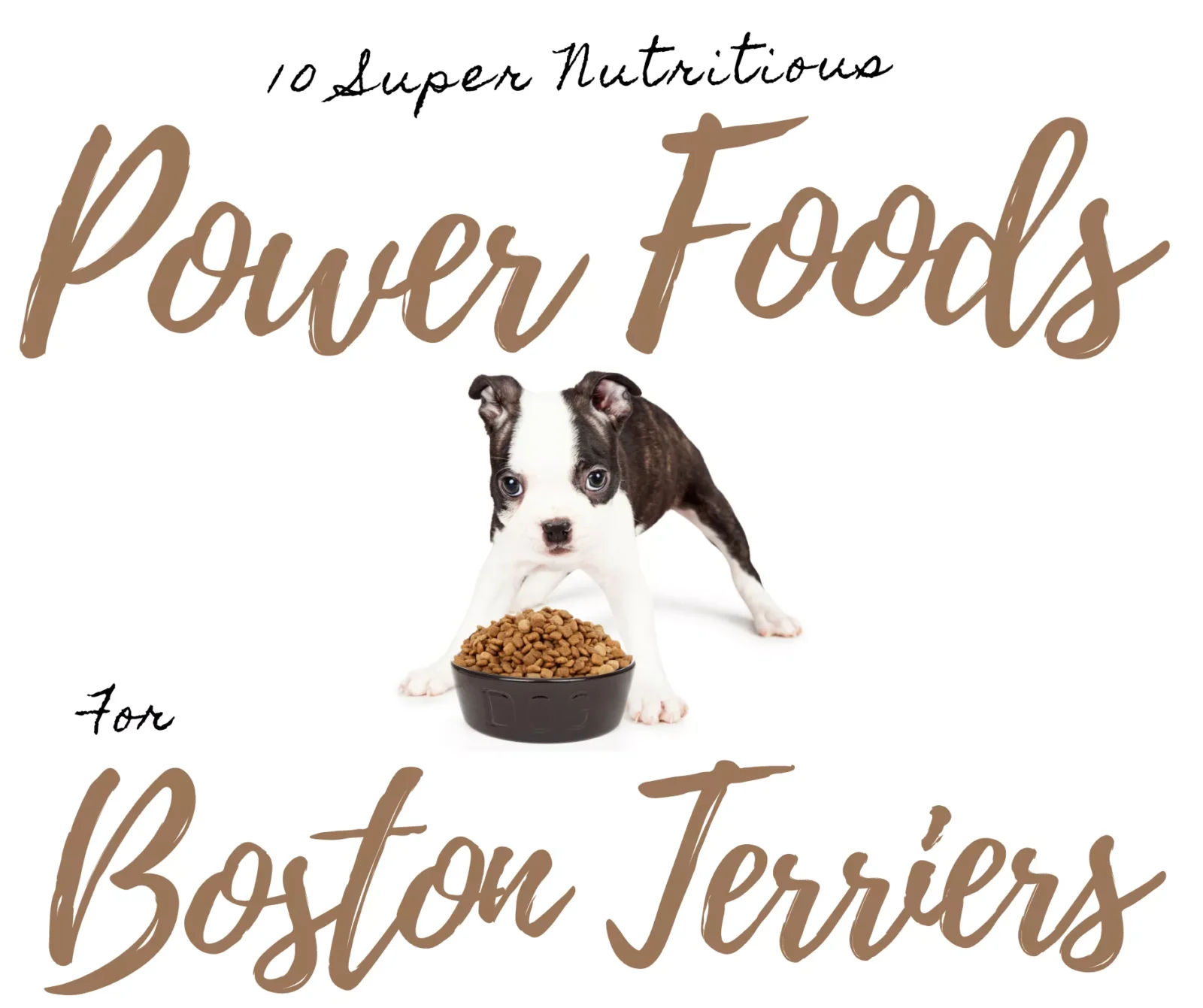Power Foods for Boston Terriers: A Comprehensive Guide
Introduction
Proper nutrition is crucial for the well-being of our beloved Boston Terriers. Providing them with a balanced and nutritious diet not only supports their overall health but also ensures they have the energy and vitality to lead happy, active lives. In this comprehensive guide, we’ll explore a list of power foods that are not only safe for Boston Terriers, but also offer a myriad of health benefits, as well as foods to avoid. If you’d like to read more on Boston Terrier dietary needs for every life stage, click here.

Power Foods List:
Lean Proteins as Power Foods:
Examples: Chicken, Turkey, Salmon, Lean Beef
Why: Boston Terriers thrive on high-quality protein sources that promote muscle development and overall health.
Lean proteins, such as chicken, turkey, salmon, and lean beef, are excellent power food choices for Boston Terriers due to several health benefits. These protein sources are not only highly digestible, but also rich in essential amino acids, which play a crucial role in promoting muscle development and overall well-being.
Muscle Development:
Why: Protein is essential for the growth and repair of tissues, making it crucial for the development and maintenance of strong, healthy muscles. Boston Terriers, like all dogs, benefit significantly from a protein-rich diet to support their active lifestyle and maintain optimal body condition.
Amino Acids:
Why: Amino acids are the building blocks of proteins, and different proteins contain various amino acid profiles. Lean meats provide a well-balanced array of amino acids necessary for the synthesis of proteins in the body. This is particularly important for Boston Terriers, as they require specific nutrients to support their unique physiology.
Digestibility:
Why: Lean proteins are generally more easily digestible for dogs, reducing the risk of gastrointestinal upset. Boston Terriers can be sensitive to certain foods, and opting for lean protein sources helps ensure that they receive the nutrients they need without unnecessary strain on their digestive system.
Energy Source:
Why: Proteins can serve as a source of energy, especially for active dogs like Boston Terriers. While carbohydrates are the primary energy source, incorporating lean proteins into their diet ensures a balanced nutritional profile and helps sustain their energy levels throughout the day.
Weight Management:
Why: Lean proteins contribute to a feeling of fullness, which can be beneficial for weight management. Boston Terriers are a small breed, and maintaining a healthy weight is crucial for their overall well-being. Lean proteins provide essential nutrients without excess calories, helping to support an appropriate body condition.
Omega-3 Fatty Acids (in Salmon):
Why: Salmon, in addition to being a lean protein source, is rich in omega-3 fatty acids. These fatty acids have anti-inflammatory properties and support skin and coat health. Including salmon in a Boston Terrier’s diet can contribute to a shiny, lustrous coat and help manage skin conditions.
7. Meal Variety:
Why: Incorporating a variety of lean proteins into a Boston Terrier’s diet not only provides diverse nutrients but also adds interest to their meals. This variety can help prevent dietary boredom and encourage a healthy appetite.
It’s important to note that while lean proteins are essential, a balanced diet for Boston Terriers should include other nutrient-rich ingredients. Consulting with a veterinarian to determine the specific dietary needs of your Boston Terrier, taking into account factors like age, weight, and health status, is crucial for providing optimal nutrition.

2. Sweet Potatoes as a Power Food:
Why: Rich in fiber, vitamins, and antioxidants, sweet potatoes are an excellent power food addition for digestion and provide sustained energy.
Rich in Fiber:
Why: Sweet potatoes are a fantastic source of dietary fiber, essential for maintaining optimal digestive health in Boston Terriers. The fiber content aids in promoting regular bowel movements, preventing constipation, and supporting a healthy gastrointestinal tract. This is particularly beneficial for dogs with sensitive stomachs, and including sweet potatoes in their diet can contribute to overall digestive well-being.
Vitamins:
Why: Sweet potatoes are packed with essential vitamins, including vitamin A, vitamin C, and various B vitamins. These vitamins play crucial roles in supporting a Boston Terrier’s immune system, promoting healthy skin and coat, and contributing to overall well-being. Vitamin A, in particular, is vital for vision health, and incorporating sweet potatoes into the diet provides a natural source of this important nutrient.
Antioxidants:
Why: Antioxidants are compounds that help combat oxidative stress and inflammation in the body. Sweet potatoes contain a range of antioxidants, such as beta-carotene, which can support the immune system and contribute to the overall health of Boston Terriers. Antioxidants play a role in neutralizing free radicals, which, if left unchecked, can contribute to various health issues.
Digestive Health:
Why: The combination of fiber and other nutrients in sweet potatoes supports digestive health. A healthy digestive system is essential for nutrient absorption and utilization, ensuring that Boston Terriers get the maximum nutritional benefit from their diet. Sweet potatoes contribute to a balanced and well-functioning digestive tract.
Sustained Energy:
Why: Sweet potatoes serve as an excellent source of complex carbohydrates, providing sustained energy for Boston Terriers. Unlike simple carbohydrates that cause rapid spikes and crashes in energy levels, the complex carbohydrates in sweet potatoes release energy gradually. This is particularly beneficial for active dogs, helping them maintain consistent energy levels throughout the day.
Dietary Variety:
Why: Including sweet potatoes in a Boston Terrier’s diet adds variety to their meals, making their food more interesting and palatable. This variety can be especially helpful for picky eaters or dogs with specific dietary preferences. Mixing different nutrient-rich ingredients ensures a well-rounded and enjoyable eating experience for Boston Terriers.
Weight Management:
Why: Sweet potatoes can contribute to weight management in Boston Terriers. The fiber content promotes a feeling of fullness, reducing the likelihood of overeating. Maintaining a healthy weight is crucial for the overall health and well-being of Boston Terriers, and sweet potatoes can be a valuable addition to a balanced diet.
Nutrient Density:
Why: Sweet potatoes are nutrient-dense, meaning they provide a significant amount of vitamins, minerals, and other essential nutrients in proportion to their calorie content. This makes them a valuable addition to a Boston Terrier’s diet, ensuring that they receive essential nutrients without unnecessary excess calories.
Incorporating sweet potatoes into a Boston Terrier’s meals, whether cooked or mashed, can contribute to their overall health and happiness. However, as with any addition to a pet’s diet, it’s essential to monitor their response and consult with a veterinarian to ensure that the dietary changes align with their specific nutritional needs.

3. Blueberries: a Great Power Food Addition
Why: Packed with antioxidants, blueberries support cognitive function and offer anti-inflammatory benefits.
Antioxidant-Rich:
Why: Blueberries are a powerhouse of antioxidants, particularly anthocyanins, which contribute to their vibrant color. Antioxidants play a crucial role in protecting Boston Terriers from oxidative stress, which can lead to cellular damage and inflammation. Including blueberries as a power food in their diet supports overall health and well-being by combating free radicals and promoting a healthy cellular environment.
Cognitive Support:
Why: The antioxidants found in blueberries have been linked to cognitive health. For Boston Terriers, maintaining cognitive function is essential for their overall quality of life, especially as they age. Blueberries may contribute to supporting brain health and potentially reducing the risk of cognitive decline. Including these berries as a power food in their diet can be particularly beneficial for senior dogs.
Anti-Inflammatory Benefits:
Why: Blueberries possess anti-inflammatory properties, thanks to the presence of antioxidants and other bioactive compounds. Inflammation is a natural response to various stimuli, but chronic inflammation can lead to health issues. By incorporating blueberries into a Boston Terrier’s diet, pet owners may help manage inflammation and promote a healthier inflammatory response.
Immune System Support:
Why: The antioxidants in blueberries, along with their vitamin C content, contribute to supporting the immune system. A robust immune system is crucial for preventing and fighting off infections and illnesses. Regular consumption of blueberries can play a role in fortifying a Boston Terrier’s natural defenses, keeping them better equipped to handle various environmental challenges.
Nutrient Density:
Why: Blueberries are not only rich in antioxidants but also contain essential vitamins and minerals. These include vitamin C, vitamin K, and manganese. This nutrient density ensures that Boston Terriers receive a range of important nutrients in a small, flavorful package. This is particularly beneficial for maintaining overall health and addressing potential nutrient gaps in their diet.
Delicious and Palatable:
Why: Many dogs find blueberries delicious, making them an enjoyable treat or addition to meals. Ensuring that a dog’s food is palatable is important, especially for picky eaters or those with specific preferences. Blueberries can add a burst of natural sweetness and flavor to a Boston Terrier’s diet, making mealtime more enticing.
Dental Health:
Why: The texture of blueberries, along with their size, can contribute to dental health in dogs. The act of chewing on these small, round berries may help promote good oral hygiene by assisting in the removal of plaque and debris. While not a substitute for regular dental care, including foods with dental benefits can be a positive aspect of a comprehensive oral care routine.
Low in Calories:
Why: Blueberries are relatively low in calories, making them a healthy snack or addition to meals without contributing excessive calories. This can be beneficial for Boston Terriers that require weight management or for pet owners looking to provide nutrient-rich treats without a significant impact on their dog’s calorie intake.
In summary, blueberries are a delightful and nutritious addition to a Boston Terrier’s diet, offering a range of health benefits from cognitive support to anti-inflammatory properties. As with any dietary changes, moderation is key, and pet owners should consult with a veterinarian to ensure that blueberries align with their dog’s specific nutritional needs and health status.

4. Pumpkin: A High Fiber Power Food
Why: A great source of fiber, pumpkin aids digestion and can be particularly helpful for dogs with sensitive stomachs.
Rich in Fiber:
Why: Pumpkin is an excellent source of dietary fiber, providing both soluble and insoluble fiber. This high fiber content power food contributes to digestive health in Boston Terriers by supporting regular bowel movements and preventing issues such as constipation. Adequate fiber intake is crucial for maintaining a healthy and well-functioning digestive system.
Digestive Aid:
Why: The fiber in pumpkin acts as a natural digestive aid. It helps regulate the passage of food through the digestive tract, promoting optimal digestion and nutrient absorption. For Boston Terriers with sensitive stomachs or prone to digestive issues, incorporating pumpkin into their diet can provide relief and contribute to smoother digestion.
Hydration Support:
Why: Pumpkin has a high water content, contributing to the overall hydration of Boston Terriers. Proper hydration is essential for various bodily functions, including digestion. The combination of fiber and water in pumpkin can help maintain healthy moisture levels in the digestive system, preventing issues related to dehydration and promoting overall well-being.
Nutrient-Rich:
Why: In addition to its fiber content, pumpkin is rich in essential nutrients such as vitamins A, C, and E, as well as potassium and antioxidants. These nutrients play a vital role in supporting a Boston Terrier’s overall health, including immune function, skin and coat health, and cellular protection against oxidative stress.
Weight Management:
Why: Pumpkin is a low-calorie power food that can be beneficial for weight management in dogs. For Boston Terriers needing to maintain a healthy weight or those prone to weight gain, incorporating pumpkin into their meals allows for a satisfying and nutritious addition without a significant increase in calorie intake. This can be especially helpful as part of a balanced weight management plan.
Palatability:
Why: Many dogs find the taste of pumpkin appealing, making it a palatable addition to their meals. For picky eaters or dogs with specific taste preferences, incorporating pumpkin can enhance the overall flavor of their food. This is particularly useful when introducing new foods or supplements into a Boston Terrier’s diet.
Stool Quality:
Why: The fiber content in pumpkin contributes to the formation of well-formed stools. It can have a firming effect on stools, which is beneficial for dogs with loose or irregular bowel movements. Maintaining consistent and healthy stool quality is an important indicator of digestive health in Boston Terriers.
Versatility:
Why: Pumpkin can be included in various forms in a Boston Terrier’s diet, including canned pumpkin puree or cooked and mashed fresh pumpkin. This versatility allows pet owners to choose the most convenient and well-received form for their dog. Additionally, pumpkin can be a valuable ingredient in homemade dog treats or as a topping for regular meals.
In conclusion, pumpkin is a nutritional powerhouse that offers multiple benefits for Boston Terriers, from supporting digestive health to providing essential nutrients. As with any dietary changes, it’s essential to introduce new foods gradually and consult with a veterinarian to ensure that pumpkin aligns with a dog’s specific nutritional needs and any underlying health considerations.

5. Carrots as Teeth Cleaning Power Food:
Why: Low in calories and high in vitamins, carrots make for a crunchy, teeth-cleaning snack.
Low in Calories:
Why: Carrots are a low-calorie vegetable, making them an excellent option for Boston Terriers, especially those on a calorie-conscious diet. As a low-calorie power food, carrots provide a satisfying and crunchy texture without contributing to excessive calorie intake. This makes them suitable for dogs that need to maintain a healthy weight or are prone to weight gain.
Nutrient-Rich:
Why: Despite being low in calories, carrots are packed with essential nutrients, including vitamins A, C, and K. These vitamins play crucial roles in supporting various aspects of a Boston Terrier’s health, such as immune function, vision, and blood clotting. The nutrient density of carrots adds a nutritional boost to a dog’s diet.
Teeth-Cleaning Properties:
Why: The natural crunchiness of carrots provides a teeth-cleaning benefit for Boston Terriers. Chewing on carrots helps promote dental health by reducing plaque and tartar buildup on the teeth. The abrasive texture of carrots, combined with the chewing action, contributes to maintaining good oral hygiene in dogs. This can be particularly beneficial for dogs that enjoy chewing and may not be fond of traditional dental care practices.
Antioxidant Content:
Why: Carrots contain antioxidants, such as beta-carotene, which have anti-inflammatory and immune-boosting properties. These antioxidants help protect cells from damage caused by free radicals, contributing to overall cellular health. Including the power food carrots in a Boston Terrier’s diet provides a natural source of antioxidants that support their well-being.
Dietary Fiber:
Why: Carrots are a good source of dietary fiber, which aids in digestion and promotes regular bowel movements. The fiber content adds bulk to the diet, helping maintain healthy and consistent stool quality. For Boston Terriers with sensitive stomachs or digestive concerns, the inclusion of carrots can contribute to digestive comfort.
Hydration Support:
Why: While not as water-rich as some fruits and vegetables, carrots do contain a moderate amount of water. This contributes to hydration, supporting a dog’s overall water intake. Proper hydration is essential for various physiological functions, including digestion, nutrient absorption, and temperature regulation.
Natural Treat Alternative:
Why: Carrots serve as a natural and wholesome alternative to commercial dog treats. They offer a tasty and satisfying snack without the added preservatives, colors, or flavors found in some commercial treats. This makes carrots a convenient option for pet owners seeking healthy and minimally processed treat choices for their Boston Terriers.
Digestive Health:
Why: The combination of fiber and water in carrots supports digestive health by promoting regular bowel movements. This can be particularly beneficial for dogs prone to constipation or irregular stools. Including carrots as a power food in the diet contributes to a well-rounded and digestive-friendly approach to nutrition.
In summary, carrots are a versatile and nutrient-packed addition to a Boston Terrier’s diet, providing a range of health benefits from dental care to immune support. As with any treat or dietary addition, it’s important to monitor a dog’s individual response and consult with a veterinarian to ensure that carrots align with their specific nutritional needs and health status.

6. Greek Yogurt: a Palatable Power Food Addition:
Why: Probiotics in Greek yogurt promote gut health, and it’s a calcium-rich option for strong bones.
Probiotics for Gut Health:
Why: Greek yogurt, as a power food addition, is a rich source of probiotics, which are beneficial bacteria that support a healthy gut microbiome. Probiotics play a crucial role in promoting digestive health by maintaining a balance of microorganisms in the gastrointestinal tract. For Boston Terriers, a healthy gut contributes to proper digestion, nutrient absorption, and overall well-being.
Digestive Enzymes:
Why: In addition to probiotics, Greek yogurt contains digestive enzymes that aid in the breakdown of nutrients during digestion. These enzymes contribute to the efficient absorption of essential nutrients from food, supporting the dog’s overall nutritional status. Including Greek yogurt as a power food additive in a Boston Terrier’s diet provides a natural source of these digestive enzymes.
Calcium-Rich Option:
Why: Greek yogurt is a calcium-rich food, and calcium is a vital mineral for the development and maintenance of strong bones and teeth. Boston Terriers, like all dogs, benefit from adequate calcium intake to support their skeletal structure. Incorporating Greek yogurt into their diet contributes to meeting their calcium requirements.
Protein Content:
Why: Greek yogurt is a good source of high-quality protein, essential for muscle development, maintenance, and various physiological functions. Protein is a crucial component of a balanced canine diet, and Greek yogurt offers a nutrient-dense option for meeting a dog’s protein needs. This is particularly important for active or growing Boston Terriers.
Palatability and Variety:
Why: Many dogs find Greek yogurt palatable, making it a convenient option for pet owners looking to add variety to their Boston Terrier’s diet. The creamy texture and tangy flavor of Greek yogurt can enhance the appeal of meals or serve as a tasty treat. This versatility adds enjoyment to a dog’s eating experience.
Proactive Oral Health:
Why: The act of licking or consuming Greek yogurt may have mild oral health benefits for Boston Terriers. While not a substitute for regular dental care practices, the licking action involved in enjoying yogurt can contribute to the removal of some plaque from the teeth. This can be a positive aspect of oral hygiene maintenance.
Cooling Treat Option:
Why: During warmer months, frozen Greek yogurt can be prepared as a cooling and refreshing treat for Boston Terriers. The cold temperature and appealing taste make it an enjoyable snack, and the freezing process can provide additional relief on hot days. This frozen treat option adds a fun and practical element to a dog’s diet.
Sensitive Stomach Support:
Why: The probiotics in Greek yogurt may offer support for dogs with sensitive stomachs. Introducing probiotics can help balance the gut flora and potentially alleviate some digestive discomfort. For Boston Terriers prone to digestive issues, Greek yogurt can be a gentle addition that contributes to digestive well-being.
Source of B Vitamins:
Why: Greek yogurt contains B vitamins, including B12, which play essential roles in energy metabolism, nerve function, and the formation of red blood cells. These vitamins contribute to a dog’s overall vitality and health. Including Greek yogurt as part of a well-rounded diet adds a nutrient boost to support these important functions.
In conclusion, Greek yogurt offers a range of nutritional benefits for Boston Terriers, from promoting gut health to providing essential nutrients like calcium and protein. As with any dietary addition, it’s important to introduce new foods gradually, monitor the dog’s response, and consult with a veterinarian to ensure that Greek yogurt aligns with their specific dietary needs and health status.

7. Quinoa: a Gluten-Free Power Food:
Why: A complete protein source, quinoa is gluten-free and provides essential amino acids.
Complete Protein Source:
Why: Quinoa stands out as a power food powerhouse, complete protein source, meaning it contains all nine essential amino acids necessary for various physiological functions in Boston Terriers. Amino acids are the building blocks of proteins, crucial for muscle development, repair, and overall canine health. The completeness of quinoa’s protein profile makes it a valuable power food addition to a balanced dog diet.
Gluten-Free Option:
Why: Quinoa is naturally gluten-free, making it suitable for Boston Terriers with gluten sensitivities or allergies. Gluten intolerance can manifest in digestive issues and discomfort for some dogs. By incorporating power food, gluten-free grains like quinoa, pet owners can provide a nutritious alternative that aligns with their dog’s dietary needs.
Rich in Dietary Fiber:
Why: Quinoa contains dietary fiber, which contributes to digestive health in dogs. Adequate fiber intake supports regular bowel movements, prevents constipation, and promotes a healthy gastrointestinal system. Boston Terriers can benefit from the fiber content in the power food quinoa as part of a well-rounded diet.
Essential Micronutrients:
Why: Beyond its protein content, quinoa is a source of essential micronutrients, including magnesium, iron, and zinc. These minerals play vital roles in various physiological processes, such as oxygen transport, immune function, and enzymatic reactions. Including quinoa in a Boston Terrier’s diet adds a spectrum of micronutrients that contribute to overall well-being.
Balanced Carbohydrate Source:
Why: Quinoa serves as a balanced carbohydrate source, offering energy in the form of complex carbohydrates. Balanced energy is crucial for the active lifestyle of Boston Terriers, supporting their playfulness, exercise, and daily activities. The slow-release energy from complex carbohydrates helps maintain consistent energy levels throughout the day.
Antioxidant Properties:
Why: Quinoa possesses antioxidant properties due to its content of vitamins such as vitamin E and minerals like manganese. Antioxidants help neutralize free radicals in the body, contributing to cellular health and potentially providing anti-inflammatory benefits. Including quinoa in a dog’s diet adds a layer of antioxidant support.
Versatility in Preparation:
Why: Quinoa is versatile in terms of preparation, allowing pet owners to incorporate it into various dog-friendly recipes. Whether served alone, mixed with other ingredients, or combined with canine-safe vegetables and proteins, quinoa offers flexibility in providing diversity to a Boston Terrier’s meals. This versatility contributes to a well-rounded and enjoyable diet.
Sensitive Stomach Consideration:
Why: Quinoa can be gentle on the digestive system, making it a power food consideration for Boston Terriers with sensitive stomachs. Its digestibility and nutrient density make quinoa a potential alternative for dogs prone to digestive issues. However, it’s essential to introduce new foods gradually and monitor the dog’s response.
Plant-Based Protein Option:
Why: For pet owners looking to incorporate more plant-based power food protein into their Boston Terrier’s diet, quinoa provides a valuable option. While dogs are omnivores and can thrive on a variety of protein sources, introducing plant-based proteins like quinoa can diversify their nutrient intake.
In summary, quinoa offers Boston Terriers a complete protein source, gluten-free option, and a range of essential nutrients. Its versatility in preparation, coupled with potential benefits for digestive health and energy provision, makes quinoa a nutritious power food addition to a dog’s diet. As with any dietary changes, pet owners should consult with a veterinarian to ensure that quinoa aligns with their Boston Terrier’s specific nutritional needs and health conditions.

8. Green Beans: a Low Calorie Power Food
Why: Low in calories and high in nutrients, green beans are a great addition for weight management.
Low-Calorie Nutrient Boost:
Why: Green beans are a low-calorie vegetable packed power food with essential nutrients, making them an excellent addition to a Boston Terrier’s diet. The low-calorie nature of green beans contributes to weight management, a crucial aspect of canine health, particularly for dogs prone to weight-related issues.
High in Dietary Fiber:
Why: Green beans are rich in dietary fiber, a crucial component for digestive health in dogs. Adequate fiber intake supports optimal bowel movements, helps prevent constipation, and contributes to a healthy gastrointestinal system. The fiber content in green beans aids in maintaining regular and healthy digestion.
Nutrient Density:
Why: While being low in calories, green beans as a power food addition, are nutrient-dense, providing essential vitamins and minerals. These include vitamins A, C, and K, along with minerals like manganese. These nutrients play diverse roles in a dog’s health, from supporting immune function to contributing to bone health.
Weight Management Support:
Why: The combination of low-calorie content and high dietary fiber makes green beans an ideal choice for weight management in Boston Terriers. Weight management is crucial for preventing obesity-related health issues and ensuring the overall well-being of dogs. Incorporating green beans into the diet can contribute to a healthy weight.
Hydration Benefits:
Why: Green beans have a high water content, providing additional hydration to a dog’s diet. Hydration is essential for various bodily functions, including temperature regulation, joint lubrication, and nutrient transportation. Including hydrating foods like green beans supports overall canine hydration.
Dental Health Contribution:
Why: The crunchy texture of green beans can contribute to dental health in Boston Terriers. Chewing on green beans can help mechanically clean a dog’s teeth, reducing plaque and tartar buildup. Dental health is vital for preventing oral issues and promoting overall well-being.
Variety in Nutrient Intake:
Why: Incorporating green beans as a power food adds variety to a Boston Terrier’s nutrient intake. While a balanced dog food is the primary source of nutrition, including nutrient-rich vegetables like green beans ensures a diverse range of vitamins and minerals. This diversity supports overall health and vitality.
Suitable for Dogs with Dietary Restrictions:
Why: Green beans are often well-tolerated by dogs with dietary restrictions or sensitivities. Their simple composition and lack of common allergens make them a safe and nutritious option for dogs with specific dietary requirements. However, individual dogs may vary in their response to new foods.
Snacking Without Excess Calories:
Why: Green beans provide a satisfying power food snacking option for Boston Terriers without contributing excessive calories. Snacking is a natural behavior for dogs, and offering healthy, low-calorie options like green beans allows pet owners to indulge their dogs’ desire for treats without compromising their weight management goals.
Easily Prepared and Served:
Why: Green beans are easy to prepare and serve, making them a convenient addition to a Boston Terrier’s meals. Whether steamed, boiled, or served raw, green beans can be integrated into a dog’s diet in various ways. This ease of preparation adds to their appeal as a nutritious canine snack.
In conclusion, green beans as a power food addition, bring a host of nutritional benefits to Boston Terriers, from weight management support to dental health contribution. Their low-calorie, nutrient-dense profile, coupled with hydrating properties, makes green beans a valuable component of a well-balanced dog diet. As with any dietary modifications, pet owners should introduce new foods gradually and monitor their dog’s response, seeking guidance from a veterinarian when needed.

9. Eggs: A Near Perfect Power Food
Why: A protein powerhouse, eggs offer essential amino acids and are beneficial for coat health.
Protein Powerhouse:
Why: Eggs stand out as a protein power food in a Boston Terrier’s diet. Proteins are crucial for muscle development, maintenance, and various physiological functions. The high-quality protein in eggs provides essential amino acids, supporting overall health and well-being.
Amino Acid Richness:
Why: Eggs offer a spectrum of essential amino acids, which are the building blocks of proteins. Amino acids play a vital role in the formation of tissues, enzymes, and hormones, contributing to the overall structural and functional integrity of a dog’s body. Boston Terriers benefit from the amino acid richness found in eggs.
Biotin for Coat Health:
Why: Eggs are a natural power food source of biotin, a B-vitamin known for its role in promoting coat health. Biotin contributes to a shiny, lustrous coat and healthy skin. Boston Terriers, with their sleek coats, can benefit from the biotin content in eggs, supporting both aesthetic and dermatological aspects of their well-being.
Omega-3 Fatty Acids:
Why: Eggs, particularly those from pasture-raised or omega-3 enriched sources, contain omega-3 fatty acids. Omega-3s are beneficial for various aspects of canine health, including anti-inflammatory effects and support for cardiovascular and joint health. Incorporating eggs as a power food into a Boston Terrier’s diet contributes to a well-rounded nutritional profile.
Nutrient Density:
Why: Eggs are nutrient-dense, providing not only proteins but also essential vitamins and minerals. These include vitamin A, vitamin D, vitamin E, and various B-vitamins. The diverse nutrient content in this power food enhances the overall nutritional value of eggs, making them a wholesome addition to a dog’s diet.
Easily Digestible:
Why: Eggs are highly digestible for dogs, making them a suitable power food protein source for Boston Terriers with sensitive stomachs. The digestibility of eggs ensures that the nutrients they contain are efficiently absorbed, supporting optimal nutrient utilization by the dog’s body.
Versatile Preparation:
Why: Eggs offer versatility in preparation, allowing pet owners to incorporate them into a Boston Terrier’s diet in various ways. Whether served boiled, scrambled, or as an ingredient in homemade dog treats, eggs can be adapted to suit different preferences and dietary requirements.
Balanced Nutrition:
Why: Eggs contribute to balanced nutrition for Boston Terriers by providing a mix of essential power food nutrients. From proteins to vitamins and minerals, eggs offer a well-rounded nutritional profile that complements the core components of a dog’s regular diet.
Support for Growth and Development
Why: The protein and nutrient content in eggs is particularly beneficial for the growth and development of Boston Terrier puppies. Eggs can play a role in supporting the formation of healthy tissues, bones, and organs during the crucial stages of puppyhood.
Convenient and Cost-Effective:
Why: Eggs are readily available, making them a convenient and cost-effective power food addition to a Boston Terrier’s diet. Their accessibility ensures that pet owners can provide a wholesome and nutritious treat without the need for elaborate preparation or expensive ingredients.
In summary, eggs bring a wealth of nutritional benefits to Boston Terriers, ranging from high-quality protein to essential vitamins and minerals. Their role in promoting coat health, supporting growth, and offering a convenient protein source makes eggs a valuable dietary component. Pet owners should ensure that eggs are prepared in a dog-safe manner, avoiding additives like salt and seasoning. As with any dietary adjustments, individual dog sensitivities should be considered, and consultations with a veterinarian can provide personalized guidance.

10. Oatmeal: A Power Food for Digestive Health
Why: A good source of soluble fiber, oatmeal supports digestive health and provides lasting energy.
Soluble Fiber for Digestive Health:
Why: Oatmeal serves as a valuable power food addition to a Boston Terrier’s diet due to its high content of soluble fiber. Soluble fiber plays a crucial role in supporting digestive health by promoting regular bowel movements and preventing constipation. For Boston Terriers, a breed that can be prone to digestive sensitivities, the inclusion of oatmeal can contribute to a healthy gastrointestinal system.
Sustained Energy Release:
Why: Oatmeal, as a power food, provides a sustained release of energy, making it an excellent option for dogs with active lifestyles. The complex carbohydrates in oatmeal are gradually broken down, providing a steady supply of energy throughout the day. This is particularly beneficial for Boston Terriers, known for their playful and energetic nature.
Nutrient-Rich Composition:
Why: Oatmeal is a nutrient-rich power food, offering essential vitamins and minerals that contribute to overall well-being. It contains nutrients such as B-vitamins, iron, magnesium, and zinc, adding to the nutritional value of a Boston Terrier’s diet. These nutrients play roles in energy metabolism, immune function, and maintaining healthy skin and coat.
Supports Weight Management:
Why: Oatmeal can be a helpful component for weight management in Boston Terriers. Its high-fiber content promotes a feeling of fullness, potentially reducing the likelihood of overeating. Maintaining a healthy weight is crucial for the overall health and longevity of dogs, and oatmeal can be part of a balanced approach to canine nutrition.
Dietary Inclusion for Seniors:
Why: For older Boston Terriers, oatmeal can be a gentle and palatable power food option. As dogs age, they may experience changes in their digestive capabilities or dental health. Oatmeal, being soft and easy to chew, can be a comforting addition to the diet of senior Boston Terriers, ensuring they receive necessary nutrients without compromising on taste and digestibility.
Allergen-Friendly Option:
Why: Oatmeal is a naturally gluten-free power food, making it a suitable option for dogs with sensitivities or allergies to wheat or gluten. Considering that some Boston Terriers may have dietary intolerances, oatmeal provides a hypoallergenic alternative that supports a varied and well-tolerated diet.
Versatile and Customizable:
Why: Oatmeal’s versatility allows pet owners to customize it to suit their Boston Terrier’s preferences. Whether served plain, mixed with dog-safe fruits, or incorporated into homemade treats, oatmeal adapts well to various preparations. This versatility ensures that dogs can enjoy oatmeal in ways that align with their taste preferences.
Warm and Comforting:
Why: Oatmeal can be served warm, providing a comforting and appealing power food meal, especially during colder months. The comforting nature of oatmeal can make it an enticing option for Boston Terriers, encouraging them to eat and enjoy their meals.
Suitable for Dogs with Sensitive Stomachs:
Why: The gentle nature of oatmeal makes it suitable for dogs with sensitive stomachs. If a Boston Terrier is experiencing digestive issues or has a history of sensitivities, incorporating oatmeal into their diet can be a gentle way to provide nourishment without exacerbating digestive concerns.
Encourages Hydration:
Why: When prepared with water, oatmeal contributes to a dog’s overall hydration. Adequate hydration is essential for various physiological functions, including digestion, nutrient absorption, and temperature regulation. Incorporating oatmeal into a Boston Terrier’s diet provides an additional avenue for supporting hydration.
In conclusion, oatmeal brings several health benefits to Boston Terriers, ranging from digestive support to sustained energy release. Its nutrient-rich composition, versatility, and suitability for dogs with specific dietary needs, make oatmeal a valuable and well-rounded addition to a Boston Terrier’s nutritional plan. As with any dietary changes, introducing oatmeal gradually and monitoring a dog’s response is advisable. Consulting with a veterinarian can provide personalized guidance based on an individual Boston Terrier’s health, age, and dietary requirements.

Answering Common Questions:
1. What is the best food to give a Boston Terrier?
The best food for a Boston Terrier is a well-balanced, high-quality dog food specifically formulated for small breeds. Look for options with real meat as the primary ingredient, adequate protein content, and essential power food nutrients like omega-3 fatty acids for skin and coat health.
2. What protein is best for Boston Terriers?
Lean proteins such as chicken, turkey, salmon, and lean beef are excellent power food choices for Boston Terriers. These protein sources support muscle development and provide essential amino acids for overall health.
3. What are high-energy foods for dogs?
High-energy power foods for Boston Terriers include sweet potatoes, quinoa, and eggs. These foods provide a combination of complex carbohydrates, proteins, and essential nutrients to sustain their energy levels throughout the day.
4. What power foods can I feed my Boston Terrier with a sensitive stomach?
For Boston Terriers with sensitive stomachs, easily digestible power foods like plain cooked chicken, rice, and pumpkin can be soothing. Additionally, specialized dog foods designed for sensitive stomachs may be a suitable option.
5. What foods may cause gas in Boston Terriers? What foods to avoid?
Certain foods may contribute to gas in Boston Terriers, including:
- Beans: High in fiber but can cause gas.
- Dairy: Some dogs may be lactose intolerant.
- Certain Vegetables: Broccoli and cabbage can be gassy.
- Fatty Foods: Excessive fat intake may lead to digestive issues.
Avoid feeding your Boston Terrier foods high in fat or difficult to digest, and monitor their individual reactions to specific ingredients. To read more on Boston Terrier flatulence issues, click here.
Ensuring the optimal health of your Boston Terrier involves providing a well-rounded, nutritious diet filled with power foods that cater to their unique needs. By incorporating a variety of nutrient-rich options into their meals, you can contribute to their overall well-being, energy levels, and longevity. Always consult with your veterinarian to create a diet plan tailored to your Boston Terrier’s specific requirements.

Optimizing Boston Terrier Health with Power Foods:
Ensuring the peak health of your Boston Terrier goes beyond routine care—it extends to their dietary choices. Power foods play a pivotal role in crafting a well-rounded, nutritious diet that caters to the distinctive needs of this beloved breed. By integrating an array of nutrient-rich options into their meals, you become a curator of their overall well-being, energy levels, and longevity.
1. Nourishing from Within:
- Why: Power foods act as internal nourishment agents, supplying essential vitamins, minerals, and antioxidants that form the foundation of your Boston Terrier’s health. This comprehensive approach ensures they receive not just sustenance but a powerhouse of nutrients vital for growth, vitality, and immune support.
2. Energizing Canine Vitality:
- Why: The term “power foods” perfectly encapsulates the ability of these nutritional choices to fuel your Boston Terrier’s vitality. A diet rich in high-energy options provides the necessary fuel for their spirited antics, ensuring they maintain an active lifestyle characteristic of the breed.
3. Prolonging Longevity with Power Nutrition:
- Why: Power foods contribute to the longevity of your Boston Terrier by addressing specific health aspects associated with aging. Antioxidant-rich choices, such as blueberries, protect against cellular damage, while lean proteins support muscle health—key components in ensuring a longer, healthier life.
4. Consulting with Canine Nutrition Experts:
- Why: Collaborating with a veterinarian ensures that the incorporation of power foods aligns with your Boston Terrier’s specific dietary requirements. These experts in canine nutrition can tailor a diet plan that considers individual health profiles, ensuring optimal nourishment and minimizing the risk of potential health issues.
5. The Transformative Power of Customization:
- Why: Power foods offer a transformative aspect to your Boston Terrier’s diet by providing customizable nutrition. This adaptability allows you to tailor their meals to suit taste preferences, dietary restrictions, and specific health needs, ensuring that each bite contributes powerfully to their overall health.
6. Preserving Canine Happiness:
- Why: A diet rich in power foods not only supports physical health but also contributes to the mental well-being of your Boston Terrier. The joy they experience during mealtime, coupled with the physiological benefits of nutritious choices, creates a harmonious blend that preserves their happiness and zest for life.
7. Power Foods as the Cornerstone of Well-Being:
- Why: Power foods act as the cornerstone of your Boston Terrier’s well-being, forming the basis for a resilient immune system, robust energy levels, and a healthy weight. This foundation ensures that your furry friend thrives in every aspect, fostering a sense of overall health and contentment.
In conclusion, power foods for Boston Terriers are not just dietary choices; they are catalysts for a vibrant, healthy life. By recognizing the transformative impact of these nutritional powerhouses and tailoring their inclusion to your Boston Terrier’s specific needs, you actively participate in shaping their well-being. Always consult with a veterinarian to create a diet plan that maximizes the benefits of power foods, ensuring your Boston Terrier receives the nourishment needed for a happy, healthy life.

This post contains affiliate links. I earn from qualifying Amazon purchases.




